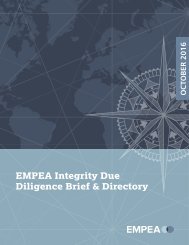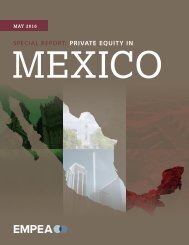Create successful ePaper yourself
Turn your PDF publications into a flip-book with our unique Google optimized e-Paper software.
average. With respect to regulatory quality and rule <strong>of</strong> law,<br />
Mauritius’s percentile rank is 79 and 78 respectively, relative<br />
to 64 and 58 for South Africa, and 30 and 29 for the SSA<br />
regional average. 58 Its regulatory quality is reflected by the<br />
fact that it has entered into a co-operation agreement with<br />
the European Securities and Markets Authority (ESMA) to<br />
allow Mauritius-domiciled funds to market in the European<br />
Union after the AIFMD became effective in 2013. 59<br />
With its reliable legal and regulatory institutions, investors can<br />
feel increasingly comfortable with the settlement <strong>of</strong> disputes<br />
in Mauritius, a key consideration for PE fund managers. In<br />
fact, international arbitration—generally speaking, a system<br />
to resolve disputes involving international agreements<br />
that is an alternative to litigation—will likely increase in<br />
Mauritius for two reasons. First, Mauritius recently opened<br />
the Mauritius International Arbitration Centre, which will<br />
apply the London Court <strong>of</strong> International Arbitration Rules.<br />
In addition, from a recent change in Mauritius’s “substance”<br />
tests for tax domiciliation, it follows that if a fund’s legal<br />
documents contain a dispute resolution mechanism (i.e.,<br />
a constitutional requirement to settle disputes in Mauritius)<br />
then the fund is seen to be evidencing Mauritius “substance,”<br />
which assists with tax domicile determinations. 60 Thus, not<br />
only will Mauritius domiciled funds be required to settle<br />
arbitration in that country, but its application <strong>of</strong> the London<br />
rules—which are well known internationally—will make<br />
funds willing to do so.<br />
5. Fund service providers<br />
Mauritius has a well-established pr<strong>of</strong>essional services<br />
sector qualified to serve the PE industry. Internationally<br />
recognised banks (e.g., Barclays and Deutsche) and<br />
auditors (e.g., PwC and KPMG) have a presence in<br />
Mauritius. It is important to note that while the availability<br />
<strong>of</strong> such services does not differentiate Mauritius from<br />
other cities in Africa such as Nairobi, Johannesburg, and<br />
Lagos, the presence <strong>of</strong> internationally recognised firms<br />
is critical to investor confidence in the region. In addition,<br />
the Board <strong>of</strong> Investment Mauritius suggests that support<br />
services required by private equity funds are affordable. 61<br />
Importantly, Mauritius boasts a largely bilingual labour<br />
force (English and French) to facilitate deals in English and<br />
French speaking African countries. 62<br />
5.2. How Does PE Domiciliation Affect the<br />
Economic Growth <strong>of</strong> Mauritius?<br />
We are also interested in the impact that PE domiciliation<br />
in Mauritius has had with respect to economic growth. While<br />
no studies appear to directly explore this link, academic<br />
literature does suggest that, broadly speaking, Mauritius’s<br />
overall economic growth has benefited significantly from<br />
its financial sector development. For example, one study<br />
found that higher levels <strong>of</strong> financing services and financial<br />
intermediary development from 1952 to 2004 in Mauritius<br />
had a measurable impact on output (real GDP per capita). 63<br />
Another study using cross-country data further found that the<br />
existence <strong>of</strong> an international financial centre had a positive<br />
influence on domestic financial development (using a variety<br />
<strong>of</strong> indicators). 64<br />
Still, while financial sector development has indeed been shown<br />
to reduce inequality in African countries, 65 PE domiciliation<br />
contributes most directly to high-skilled jobs in the form <strong>of</strong> support<br />
services to the PE firms (e.g., legal, financial, accounting). In<br />
fact, Global Business Companies (GBCs) in Mauritius, which<br />
comprise the <strong>of</strong>fshore financial sector, directly (i.e., not including<br />
financial, legal or accounting support services to GBCs) are<br />
estimated to contribute only about 0.2% <strong>of</strong> total employment<br />
(as <strong>of</strong> June 2012). 66 As discussed in Section 3, however, PE<br />
firm location decisions with respect to headquarters and <strong>of</strong>fices<br />
appear to be extremely important with respect to value creation<br />
and can have a major impact on entrepreneurship in the country.<br />
The above analyses <strong>of</strong>fer just a snapshot <strong>of</strong> the investor attitudes<br />
that drive domiciliation choices and the subsequent impact on<br />
economic performance. Below, we highlight several implications<br />
regarding the viability <strong>of</strong> new onshore financial centres in Africa.<br />
6. IMPLICATIONS FOR AFRICA<br />
In this paper we discussed the location choices <strong>of</strong> PE firms<br />
with respect to headquarters / <strong>of</strong>fices and domiciles. We<br />
explained how risk capital provided by PE funds can help<br />
loosen the financial constraints faced by SMEs in Africa,<br />
while the PE investment model adds value in other ways,<br />
such as improved management practices. Increased PE<br />
activity can have a more widespread entrepreneurial impact,<br />
extending beyond each individual deal. PE managers<br />
have found, however, that the “fly in, fly out” model is not<br />
appropriate for frontier markets such as Africa, because<br />
<strong>Conduits</strong> <strong>of</strong> <strong>Capital</strong> – Onshore Financial Centres and Their Relevance to African Private Equity<br />
| 59





